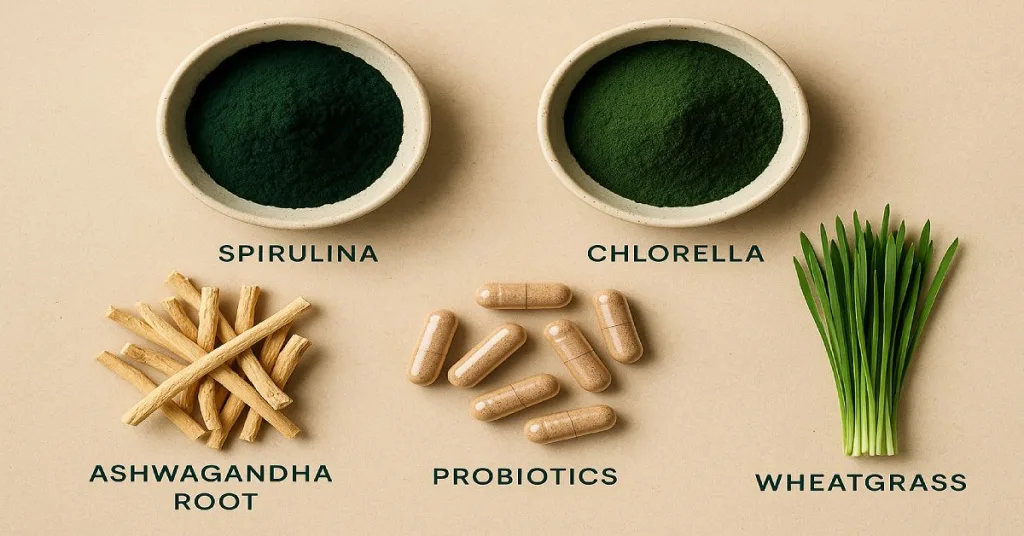This Athletic Greens Review looks at AG1, the greens powder dominating the supplement world. It’s pitched as a one-scoop daily ritual that delivers “foundational nutrition” — vitamins, minerals, probiotics, adaptogens, and antioxidants.
The promise? Better energy, digestion, immunity, and long-term health. The question? Does AG1 actually deliver on those promises — or is it just another overhyped wellness trend?
This review strips AG1 down to the facts: the ingredients, the dosing, the benefits, and the limitations. We’ll also address one of the biggest myths around AG1 — whether it can actually replace eating vegetables.
This post may contain affiliate links. If you click and purchase, I may earn a small commission at no extra cost to you. I only recommend products I personally use or have thoroughly researched.
What Is AG1 Supposed to Do?
AG1 markets itself as a nutritional insurance policy. The idea is that if your diet isn’t perfect (and whose is?), one scoop fills the gaps. The main claims include:
- More daily energy
- Stronger immune defense
- Better gut health and digestion
- Stress support from adaptogens
- Healthy aging through antioxidants
The convenience is appealing — mix, drink, done. But convenience is not the same as effectiveness.

What’s Inside AG1?
AG1 advertises “75 vitamins, minerals, and whole-food–sourced ingredients.” Based on the label, this is really a mix of ~21 vitamins/minerals plus four proprietary blends.
Vitamins & Minerals
- Vitamin C: 420 mg (467% DV)
- Vitamin B12 (methylcobalamin): 22 mcg (917% DV)
- Biotin: 330 mcg (1100% DV)
- Vitamin E: 83 mg (553% DV)
- Magnesium (glycinate): 26 mg (6% DV)
- Zinc (citrate): 15 mg (136% DV)
- Vitamin D (cholecalciferol): 20 mcg (800 IU, 100% DV)
These amounts range from solid (vitamin C, B12, zinc) to underwhelming (magnesium at just 6% DV). It’s supportive, not complete.
Proprietary Blends
- Alkaline, Nutrient-Dense Raw Superfood Complex (7,388 mg): spirulina, chlorella, wheat grass, barley leaf, broccoli, spinach, cocoa polyphenols, green tea, ginger, licorice, papaya, bilberry, beet root, kelp, and more.
- Nutrient-Dense Extracts, Herbs & Antioxidant Blend (2,732 mg): pea protein isolate, citrus bioflavonoids, rhodiola, ashwagandha, milk thistle, alpha-lipoic acid, hawthorn, CoQ10, vitamin K2 (MK-7).
- Digestive Enzyme & Super Mushroom Complex (154 mg): astragalus, bromelain, burdock root, reishi, shiitake.
- Dairy-Free Probiotics (54 mg, 7.2 billion CFU): Lactobacillus acidophilus and Bifidobacterium bifidum.
The Transparency Problem
AG1 hides ingredient amounts inside blends. That means you don’t know if there’s 50 mg of ashwagandha or 500 mg. Same for rhodiola, milk thistle, or mushrooms.
Here’s why that matters:
- Ashwagandha: Research uses 300–600 mg daily.
- Rhodiola: Research uses 200–400 mg daily.
- Milk Thistle: Often 200–400 mg daily.
AG1 doesn’t disclose exact amounts, so you can’t confirm if you’re getting effective doses. This makes AG1 more of a broad cover supplement than a therapeutic one.
What Benefits Can You Expect?
Based on label data, AG1 can reasonably deliver:
- Daily nutrient support — especially vitamin C, B12, zinc.
- Gut health — probiotics at 7.2 billion CFU are meaningful.
- Digestive help — enzymes may reduce bloating or improve tolerance.
- Convenience — one scoop is easier than juggling bottles.
But don’t expect it to:
- Replace a complete multivitamin.
- Deliver strong adaptogen effects.
- Act as a performance booster or fat-loss aid.
If you’re considering it, you can see Athletic Greens (AG1) availability on Amazon here.
Can AG1 Replace Vegetables?
This is one of the most common misconceptions about greens powders. Many people assume that because AG1 contains spirulina, spinach, wheat grass, and other plants, it can stand in for actual vegetables.
The truth: AG1 is not a vegetable replacement.
- Whole vegetables provide fiber, water, bulk, and phytonutrients that powdered extracts can’t replicate.
- The 7 grams of greens blend is concentrated, but it’s not equivalent to eating several servings of fresh produce.
- AG1 adds micronutrients and phytonutrient extracts — useful, but not a substitute for chewing broccoli, kale, or spinach.
Think of AG1 as a supplement to a diet that already includes vegetables, not an excuse to skip them.

Side Effects & Safety
AG1 is generally safe, but potential issues include:
- Gas, bloating, or loose stool (from probiotics and enzymes).
- Vitamin K2 content — a concern for people on blood thinners.
- Allergens — contains soy lecithin (though no soy protein).
- Nausea if taken on an empty stomach.
Who Is AG1 Best For?
- Frequent travelers who can’t take multiple supplements.
- Busy professionals who often skip meals.
- People who hate pills and prefer a single scoop drink.
Who Should Skip It?
- Supplement optimizers who want clinical dosing of adaptogens, herbs, or mushrooms.
- People expecting it to replace vegetables — it doesn’t.
- Budget-conscious users who could get more precise results with separate products.
Verdict
Athletic Greens (AG1) is a well-rounded convenience supplement. It delivers solid vitamins, minerals, probiotics, and phytonutrients in a single scoop. For people who want coverage without the hassle of multiple pills, it’s attractive.
But the lack of dosing transparency makes it impossible to call AG1 therapeutic. It works as a nutritional insurance policy, not as a targeted solution. And it should never be treated as a replacement for whole vegetables.
Bottom line: AG1 is useful for coverage and convenience, but it’s not the miracle the marketing implies.
Still interested? You can read customer reviews and compare options for Athletic Greens (AG1) on Amazon.
Sources
- National Institutes of Health – Office of Dietary Supplements (Vitamin & Mineral Fact Sheets)
- Chandrasekhar K, et al. “A prospective, randomized double-blind, placebo-controlled study of safety and efficacy of a high-concentration full-spectrum extract of Ashwagandha root in reducing stress and anxiety.” Indian J Psychol Med. 2012.
- Darbinyan V, et al. “Rhodiola rosea in stress-induced fatigue.” Phytomedicine. 2000.
- Mayo Clinic – Probiotics: What You Need to Know
- Manufacturer’s Official Website – Athletic Greens (AG1) Supplement Facts
see also: Can Supplements Replace Vegetables? the Whole Truth